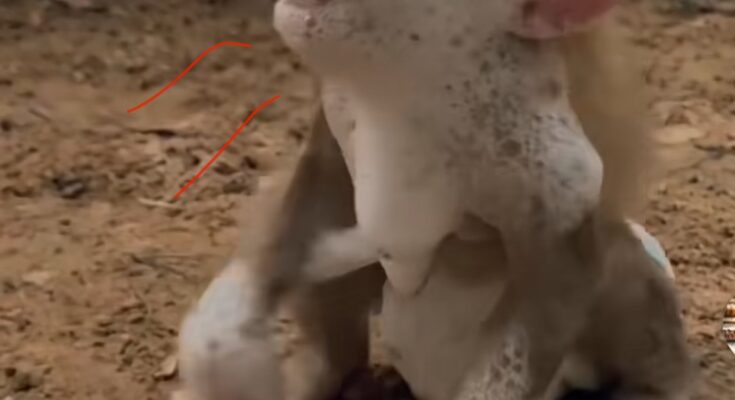Monkeys are some of the most intelligent and emotionally expressive animals on the planet. So, when a baby monkey gets hurt—even in a minor way—it can be a distressing sight for both the animal and its caregiver. One common yet underestimated hazard in rescue centers, sanctuaries, or even during bathing routines is soap accidentally getting into a baby monkey’s eyes. This seemingly small incident can quickly turn into an emergency if not handled properly.
The Incident: A Common Mistake with Serious Effects
Recently, at a wildlife sanctuary, a baby macaque named Kavi was being given a routine bath after a muddy day of play. During the bath, a small amount of soap accidentally entered his eyes. What followed was immediate distress: frantic blinking, eye rubbing, crying vocalizations, and clear signs of discomfort. Like human infants, baby monkeys are extremely sensitive to foreign substances, especially in their eyes.
Immediate Response: Staying Calm and Acting Quickly
The first step in such a situation is to remain calm. Panicking only increases the animal’s stress. The caregiver quickly stopped the bath and gently wrapped Kavi in a clean towel to limit his movements. Preventing him from rubbing his eyes was crucial, as this could lead to scratches on the cornea.
Next, clean lukewarm water was used to flush his eyes. A soft plastic syringe (no needle) was used to direct a gentle stream into each eye, thoroughly washing out the soap. This process lasted several minutes, allowing enough time for any remaining residue to be cleared.
Signs to Watch For After Exposure
Even after flushing, caregivers must monitor the baby monkey for any signs of lingering irritation or infection, including:
-
Redness or swelling around the eye area
-
Excessive blinking or tearing
-
Avoidance of light
-
Lack of appetite or unusual behavior
In Kavi’s case, while the initial flushing helped relieve most of the discomfort, slight redness remained. A wildlife veterinarian was immediately consulted.
Veterinary Care and Follow-Up
The vet prescribed a saline eye wash and a gentle antibiotic eye ointment to prevent infection. Thankfully, with careful handling and regular treatment, Kavi’s eyes healed completely in a few days, with no lasting damage.
Prevention: Safe Bathing Practices for Baby Monkeys
To avoid such incidents in the future, sanctuaries and caregivers should adopt safer bathing protocols:
-
Use tear-free, animal-safe shampoo designed for sensitive skin.
-
Avoid using soaps or products near the eyes.
-
Always have a flushing kit ready—sterile water, eye droppers, and saline.
-
Bathe in pairs when possible: one person to hold, another to wash.
Final Thoughts
Baby monkeys, like human infants, rely on their caregivers for protection, comfort, and safety. What might seem like a minor mistake can quickly become serious if not addressed with care and urgency. Kavi’s story is a gentle reminder that every small life deserves thoughtful handling, and that even something as simple as soap can turn into a lesson in compassion and responsibility.



